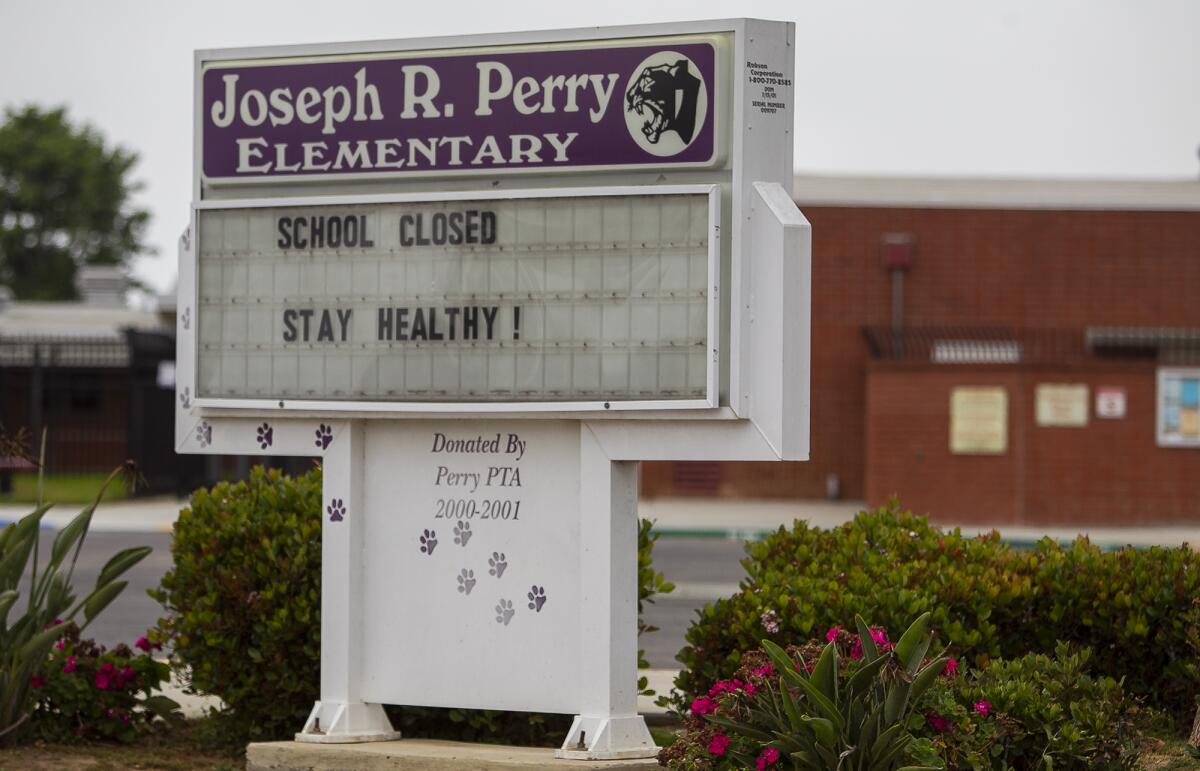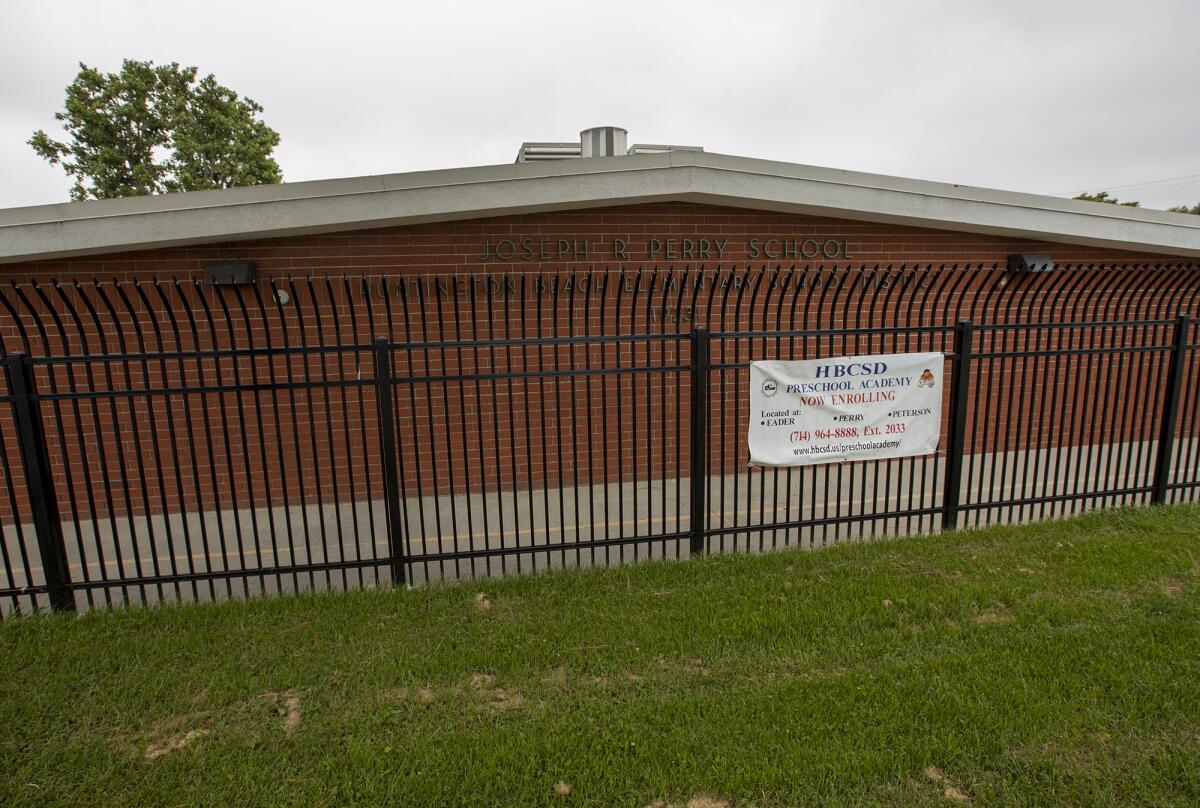Huntington Beach votes to close Perry Elementary; residents and legal defense group call it discrimination
- Share via
The Huntington Beach City School District board unanimously voted to shutter an elementary school that disproportionately serves an ethnic and socioeconomic minority within the district boundary, leaving community members lamenting that the decision will disproportionately hit already-disadvantaged students and a legal aid organization suggesting the closure may constitute a violation of a state anti-discrimination law.
The board of trustees voted in a special meeting held virtually via Zoom on Tuesday to close Joseph R. Perry Elementary School.
A district-selected school-closure task force voted 7-4 on April 12 to recommend shuttering Perry, located at 19231 Harding Lane, in an effort to right the district’s budget woes and justified by declining enrollment at the campus.
“Anyone can skew this to meet their agenda, but I know that in my heart that I have followed the guidelines that were laid down by this board in evaluating, not just this school closure, but our budget issues, and I feel strongly that at this time ... we have no option to vote but to close the school,” board member Shari Kowalke said before casting her vote.
Board member Diana Marks called the engagement by parents and residents indicative of “how awesome of a district we have” during her remarks before affirming her support for the vote. Though she was “saddened” by it, she said “we can’t go back and change” earlier decisions and “I don’t want to repeat mistakes that were made in the past.”
More than 300 participants were logged on to the online meeting, where board members heard public comments read by district staff.
Board member Paul Morrow criticized his colleagues for not considering all district campuses to be cut, though. For the sake of moving forward, he voted for the closure.
Superintendent Greg Haulk reiterated that the district “has had a structural defect for some time,” referencing the $6.8 million in budget cuts anticipated for the 2020-21 school year.
Some parents accused the district of setting up Perry to fail by passing over the site for updates and allowing enrollment to dwindle. They attribute that to the district’s unrestricted transfer policy across district schools, and to what one parent called “school shopping” by families of incoming students.
Perry, the only of the district’s seven primary schools located in the north part of the district, stands apart from others for the socioeconomic and racial makeup of its geographic tract.
According to Public School Review, Perry has 373 students, representing declines of 20% over five school years. Perry’s current roster of teachers, numbering 15, according to the school’s website, have similarly dwindled.

Perry parent Valeria Espinoza learned about the proposed school closure from her son Aaron Ramirez’s kindergarten teacher only two weeks ago. She was stunned that she hadn’t heard earlier.
Perry was where she said she enrolled 18 years ago as a fifth-grader after her family moved to Huntington Beach from Michoacán, Mexico.
At the beginning of this year, her son was nervous about starting kindergarten.
“He would cry, he was so scared to go to school,” Espinoza remembers. Now, while confined to distance-learning amid COVID-19 precautions, she said he asks, “When am I going to go back to school?”
Espinoza said she never received any phone or mail communications about the school closure or the district’s task force formation. Some parents aren’t native English speakers. Espinoza didn’t find relevant information in Spanish, either.
Over the weekend, she went door to door, talking to neighbors who were likewise in the dark about the process that might displace their kids from their familiar — and accessible — campus. Before the coronavirus pandemic closed schools for the rest of the school year, Aaron relied on school-provided transportation to get to Perry, since both parents work, Espinoza said. She worries about not knowing where her family’s new home school will be and how Aaron will get to school.
Many in Espinoza‘s Amberleaf neighborhood worry about transferring their kids to another school and losing contact with their student’s familiar faculty, she said.
As she went door to door, Espinoza collected signatures on a paper petition, mindful that not all low-income households are online.
“Where I live, everyone has a kid at Perry,” she said, adding that she collected 120 signatures on Saturday.
On Sunday, she put the petition on Change.org.
“My goal was for all the Hispanic community to sign it and for me to present it to the board so that they could hear our voice,” Espinoza said.
Some in her Latino community worry that alternate schools might not be friendly to their children.
“They fear that they are not going to be welcome at another school for the fact that we are Hispanic,” Espinoza said. “They are afraid of how teachers or even students are going to treat us.”
Four days after going online, more than 2,400 people had signed the online petition protesting the closure.
“It is a race issue, that’s what comes down to. [The school district that I teach in] would never allow something like this to happen.”
— Kurt Christensen, a Joseph R. Perry Elementary parent
The Mexican American Legal Defense and Educational Fund and League of United Latin American Citizens also made appeals to the school board.
On Monday, MALDEF doubled down on an earlier request that the board postpone the vote and reiterated concerns that the method of putting together the school-closure task force included unnecessary obstacles to participation. The application for participating was only available online, in English, and required a resume, the letter pointed out.
“These requirements are unnecessary for a task force member to adequately fulfill the role, and, instead, served as impediments preventing community members served by Perry Elementary from participating in such an important decision” wrote MALDEF staff attorney Deylin Thrift-Viveros.
It also argued that the closure would incur a burden on the district’s most disadvantaged students to travel farther to their newly assigned school.
MALDEF accused the district process of being out of compliance with the Education Code’s mandate by failing to represent the ethnic and socioeconomic composition of the district and noted that the decision might constitute a violation of state law that prevents discrimination in state-funded programs, regardless if, on its face, the decision seems neutral in its intent.
Oscar Rodriguez submitted a written comment for Tuesday’s meeting on behalf of two cousins who attend Perry.
Rodriguez stressed that there are “thousands that will be affected.” He reflected on how the school closure task force, and even Tuesday’s meeting, left out a portion of the community disproportionately represented by Perry families.
“Thousands of parents are unable to participate due to digital and language divide,” Rodriguez‘s statement said.

The district has been debating closing one of its seven elementary schools for more than a year. Perry was first on the table in October 2018.
The latest decision comes less than a year after a previous school closure task force unanimously determined that Perry should not be closed. At the time, the board unanimously agreed.
Adding to the uncertainty, the recent vote was made without determining new school tracts for displaced students, leaving many students and their families unsure of what comes next.
Perry parent and high school teacher Kurt Christensen has been active in opposing the closing of any district school for two years now.
The proximity to Perry was part of what drew Christensen, himself a product of HBCSD, to buy a house in their current neighborhood.
“You know, we both have to work and that’s one of the reasons we chose to buy where we are,” he said. “But I would not be so upset if there was a school that was just blocks or a mile away, like you see in South Huntington Beach.”
An often-repeated argument against the shuttering of Perry is that the southern part of the district has elementary campuses that are much closer to each other.
“So we have no school in the northeast portion of the school district. You know, this is our school,” he said.
The potential commute to Peterson Elementary would be nearly two miles, a giant leap from the few hundred yards his kids previously walked to Perry. Would he feel comfortable with his first- and fourth-graders crossing Yorktown, Adams and Indianapolis avenues on bikes? No.
“We’re a working family. My wife works ... Our kids walk to school, sometimes they ride their bikes, but we’re talking about a huge distance that would cross three or four major streets,” Christensen said.
The entire process has his family considering moving out of the district — or even out of the city — to retain the ability to send their kids to a neighborhood school and, hopefully, shield themselves from impending school closures.
“It is a race issue, that’s what comes down to,” said Christensen, who teaches in a low-income school district elsewhere in Orange County. The district he teaches in “would never allow something like this to happen. There’s much more support” for low-income communities within its borders, he said.
“I’ve been a teacher for over 20 years, I’m not going to send my kid to a bad school,” Christensen said. “I know that this is a fantastic school with fantastic teachers.”
All the latest on Orange County from Orange County.
Get our free TimesOC newsletter.
You may occasionally receive promotional content from the Daily Pilot.







